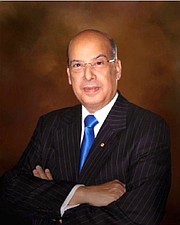By SIR RONALD SANDERS
THE Government of Canada has taken an initiative to promote a Declaration by like-minded countries against the use of arbitrary detention in state-to-state relations.
The objective of the Declaration is to achieve an end to the practice by some states of arbitrarily arresting, detaining, and sentencing foreign nationals and then bargaining with their release to influence policies or positions of their governments.
Arbitrary arrests and detentions of foreign nationals by a government is a form of institutionalised kidnapping. Using the release of such persons to influence governments amounts to demanding a ransom. It is a troubling development in international relations, one which is contrary to international law and which seeks to replace legal and diplomatic norms with a form of inter-state blackmail.
Apart from severely injuring the process of peaceful international relations, this kind of behaviour directly affects innocent persons who could be arrested, detained and sentenced simply to be used as pawns by governments that cannot get their way through international law and norms. In such conditions, persons are exposed to extreme forms of suffering while their rights are completely ignored, including their right to a fair and public hearing by a competent, independent, and impartial tribunal in instances where a state-controlled judiciary sentences them.
Fear of being arbitrarily arrested would have a deleterious effect on tourism, business travel and eventually on trade and commerce. Instead of advancing to a world of freedom, underpinned by respect for human rights and international law, the global community would recede to an age of lawlessness and conflict.
The peoples of small states would be the most vulnerable and the most “at risk” if the practice of arbitrary arrest, detention and sentencing prevails. The governments of small countries do not have the military might or economic clout to confront the authorities of powerful countries that employ these practices. Further, small countries do not have the plethora of Embassies and Consulates around the world that could try to protect their nationals. The only tool available to governments of small states is respect for international law by all states.
That is why this Declaration proposed by Canada has already won the endorsement of the governments of Antigua and Barbuda, Guyana and St Lucia. As the foreign minister of Antigua and Barbuda, E Paul Chet Greene, put it in a message to his colleague foreign ministers of Caribbean Community (CARICOM) countries: “the Declaration is as much a further layer in the structure of protection for small countries, as it is for the strengthening of international cooperation by all States to end arbitrary arrest, detention or sentencing as means to exercise leverage over other governments”.
International human rights law and instruments, particularly article 9 of the International Convention on Civil and Political Rights (ICCPR), assert that “No one shall be subjected to arbitrary arrest or detention”. They also set out obligations of states to safeguard these rights. However, the rights for which provision is made in the ICCPR apply to individuals who are within the territory of the country and subject to its jurisdiction.
The problem with all these laws and instruments is that the persons who framed them did not envisage circumstances where governments would abrogate them. Therefore, they provide for no sanctions or international measures against offending governments which use state-controlled machinery to achieve political ends, in this fashion.
The laws certainly did not contemplate circumstances in which any state would arbitrarily arrest, detain and sentence foreign nationals so as to compel actions by other states.
Canada and the countries that endorse the proposed Declaration, including the United States of America, the 28-nation European Union and nations in Africa and the Caribbean, plan to launch the Declaration on December 17. By then, other countries are expected to join.
The question arises as to why the Declaration is not being presented and pursued within the United Nations framework. Sadly, the answer is that despite the efforts of a progressive Secretary-General in António Guterres, there are members of the UN that are guilty of these unwholesome practices. They would emasculate the Declaration, stifling it in their own interest.
It is noteworthy that, in 1991, the UN Commission on Human Rights set up a Working Group on Arbitrary Detention that has been automatically renewed every three years, with a mandate to grapple with the issue. But after all this time, the essential question of dealing with states that deliberately use arbitrary arrest, detention and sentencing as a means of coercing other states, has failed to be addressed adequately.
For those governments that resolutely stand for the human, civil and political rights of peoples, including their own, the Declaration is a strong display of their collective denunciation of those states that violate them.
The majority of Caribbean countries exist and thrive as open economies that encourage and promote tourism, travel, trade and commerce, guaranteeing the rights of foreign nationals in their countries by adherence to international law.
These Caribbean countries are entitled to expect the same regard and protections for the rights of their people in foreign countries.
That’s why the Declaration Against the Use of Arbitrary Detention in State-to-State Relations is in the interest of the Caribbean’s people.
• Responses and previous commentaries: www.sirronaldsanders.com
The writer is Antigua and Barbuda’s Ambassador to the United State and the Organization of American States. He is also a Senior Fellow at the Institute of Commonwealth Studies at the University of London and Massey College in the University of Toronto. The views expressed are entirely his own.





Commenting has been disabled for this item.